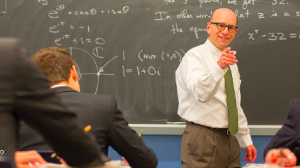Molly Limaye ’21, Avani Narula ’21, Krissie Essilfie ’21:
American Studies: Taught by Jennifer Maier and Rachael Nichols, members of the English Department, this two-credit, double-block course will be open to juniors only, replacing American Literature and United States History. It presents an interdisciplinary approach to the study of American culture in the colonial through modern eras. Nichols states, “Lots of the history and english teachers have talked about this wonderful opportunity to combine United States history and American Literature due to all of the crossover that occurs between them. The course will give the students an opportunity in class to connect the dots, see the bigger picture and the implications of things.” Maier agreed, saying “It will be nice for the students to be together with the same group of students and teachers for both English and History, and be able to make those connections together.”
Cognitive Neuroscience: Taught by Matthew Shapiro, member of the Science Department, is a semester class that links the biology of the brain to the cognitive psychological process which allow students to think and learn. Shapiro says, “I find it a fascinating topic. As a teacher, you always want to share what you’re passionate about and what you find the most interesting. It’s very interesting to teach neuroscience, especially to teenagers because brain development is very relevant to them. There is really no other course that really investigates neuroscience.”
Global Economics: A semester course taught by Adam Lavallee, this class will focus on international trade and economic development through the study of recent economic issues. Lavallee states, “Compared to our other United States centric economics classes, this course will look at economics from a global perspective. We will look at what it means to live in another country’s economic status, growth and companies. We will look at current newspaper articles, graphs and problems. The course gives an option to both students who don’t have the ability to commit to AP Econ, and to students who want to explore more than AP Econ.”
Differential Equations: Taught by Thomas Goebeler, a member of the Math Department, this college level course is a full year math elective that explores the modern, phase plane point of view in which differential equations encountered by professional practitioners are discussed

Photo Courtesy of EA Website
Foundations of Computer Science and Computer Engineering: Matt Memmo, Upper School Technology Coordinator, will teach this semester course that presents the basics of programming, digital literacy, digital citizenship, robotics concepts and engineering design concepts
Introduction to Engineering: The course is taught by George Lorenson, Chair of the Science Department and former engineer. It will build an understanding of the fundamentals of the engineering design process.
AP Physics C – Mechanics: Edward Mathisen, member of the Science Department, will teach this course. The highest level of physics to be offered at Episcopal, this course will explore classical mechanics, kinematics, Newton’s laws of motion, oscillations, gravitation and circular motion, along with many other topics.